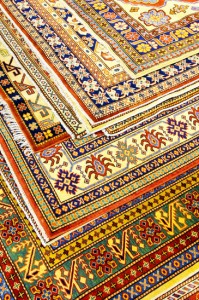Choosing a rug for your home? Not only will you have size, color and style options, you’ll also decide what fibers are right for you.
Rugs are made in two ways, either using natural fibers or synthetic fibers.
Natural fibers:
- Require more drying time because of their absorbency
- Are more easily damaged – they shrink, stain easily, show spots, fade, and attract mold and insects
- Are “green”, biodegradable, and made from renewable resources
Synthetic fibers:
- Are strong and resilient, can often handle extended periods of water and weather
- Are stain and fade resistant
- Require more frequent cleanings
- Can yellow with age, flatten, and dull with age
Natural fiber rugs include:
Wool – soft, luxurious, includes a natural stain resistance and flame retardant qualities. While it can be expensive, it also offers you value and longevity – if properly cared for, a wool rug can last 50 years or more.
Silk – soft and luxurious with a high sheen. It will fade when exposed to prolonged sunlight.
Cotton – soft but will wear quicker than wool. Stains easily and isn’t a good choice for high traffic areas.
Jute – the softest of all plant fibers, and less durable than many. It works well in low traffic areas, is mildew resistant, but can deteriorate with consistent moisture or sunlight.
Synthetic fiber rugs include:
Nylon – the most popular of all synthetic rug choices. It works well on wooden floors and will not scuff or mar the way some fibers will. Its resistant to mildew, aging and sun fading.
Polypropylene – significantly less expensive than nylon. It resists nold and fading from direct sunlight, yet easily crushed under weight.
Polyester – is soft to the feel with a wooly texture. Its best kept in low traffic areas as it tends to mat quickly.

For all of your Denver Hardwood Flooring needs visit our site today.
Speak Your Mind